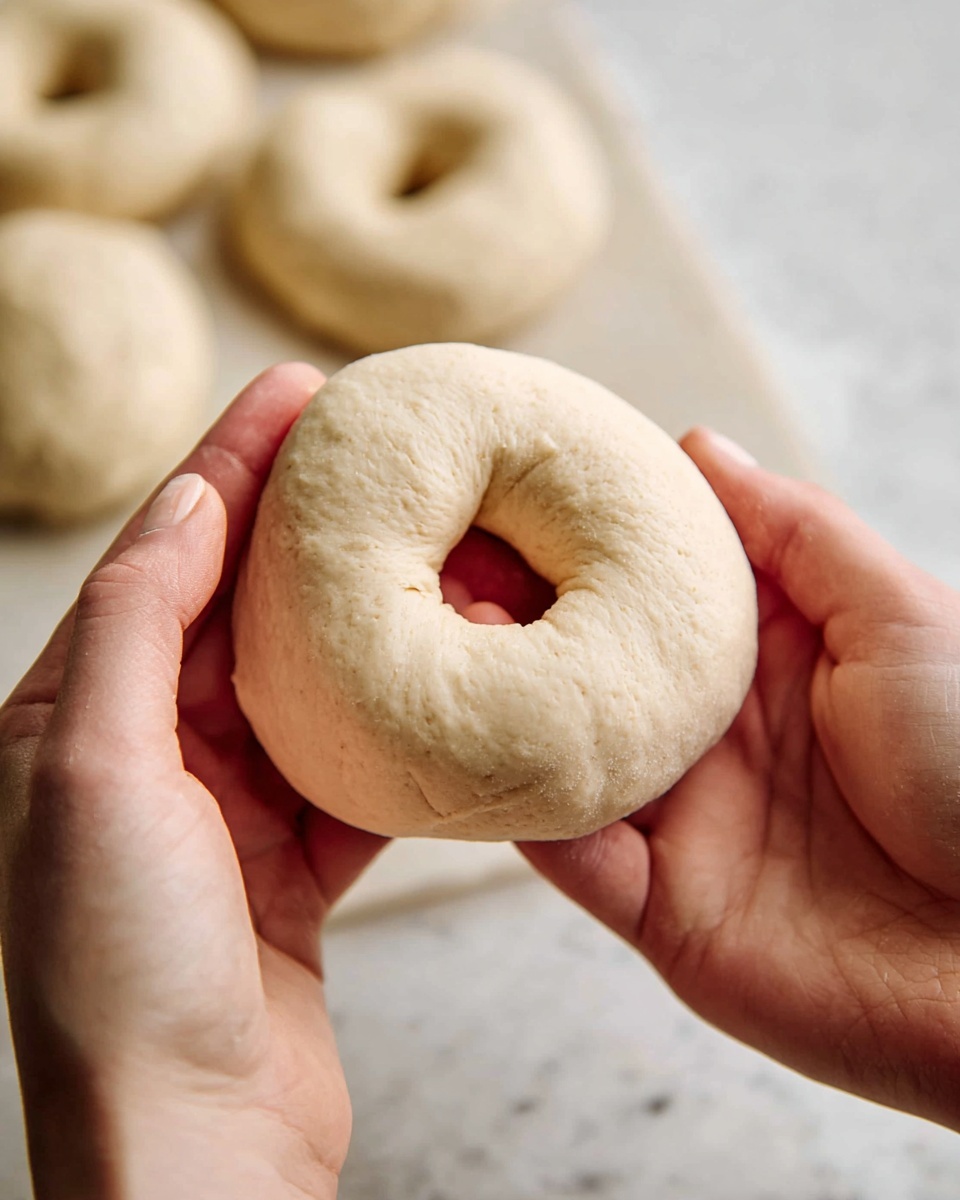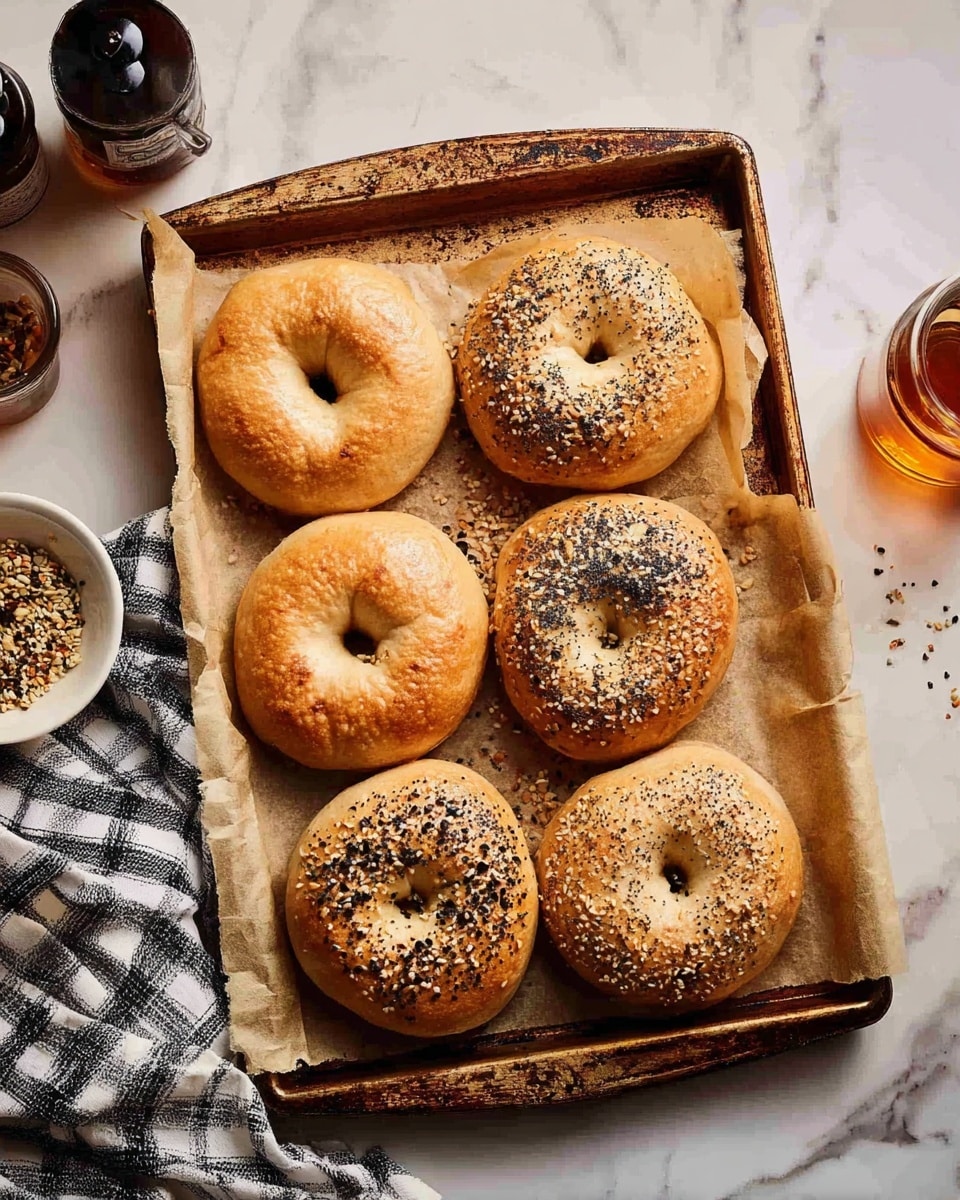
If you have ever dreamed of biting into a warm, chewy bagel with a complex flavor and the perfect crust, this Sourdough Bagels Recipe is exactly what you need. Combining the tangy depth of a naturally fermented sourdough starter with a traditional bagel-making technique, these bagels boast a crispy exterior and a delightfully soft interior. Whether you enjoy them plain, with your favorite spread, or topped with savory seasonings, these homemade bagels will transform your breakfast or brunch routine into a cozy, delicious celebration.
Ingredients You’ll Need

Creating the perfect sourdough bagels is wonderfully straightforward with just a handful of essential ingredients. Each one plays a crucial role, from providing flavor and texture to helping achieve that classic chewy bagel bite.
- Sourdough starter: This natural leavening agent gives the bagels their lovely tang and helps the dough rise beautifully.
- Warm water: Keeps the dough hydrated and activates the yeast in the starter for a smooth rise.
- Sugar: Adds just a hint of sweetness and helps to brown the crust during baking.
- Salt: Enhances the overall flavor and balances the sweetness and sourness perfectly.
- Bread flour: Provides the high protein content necessary to build that coveted chewy texture in the crumb.
- Everything But the Bagel seasoning: A delicious topping option to add extra flavor and crunch to your bagels.
How to Make Sourdough Bagels Recipe
Step 1: Mix the Dough
Begin by combining the bread flour, warm water, sourdough starter, salt, and sugar in a large mixing bowl. Mix everything thoroughly until the dough becomes smooth and slightly sticky. You can use your hands or a stand mixer for this step, whichever feels more comfortable. This initial mix starts the gluten development and ensures the ingredients are fully integrated.
Step 2: Knead and Rise
Turn the dough out onto a lightly floured surface and knead it until it becomes smooth and elastic. This kneading process is key—it develops the gluten network that will give your bagels their signature chew. After kneading, allow the dough to rest and rise in a warm spot for a few hours until it doubles in size. This natural fermentation adds depth of flavor that only sourdough can provide.
Step 3: Shape the Bagels
Once the dough has risen, divide it into eight equal portions roughly the size of a tennis ball. Roll each portion into a smooth ball, then press your finger through the center to create a hole, gently stretching it until the opening is about 1.5 to 2 inches wide. Place the shaped bagels on a parchment-lined baking sheet and let them rise again for about two hours, allowing them to puff up beautifully before boiling.
Step 4: Boil the Bagels
Bring a large pot of water to a rolling boil. Carefully lower each bagel into the boiling water and cook for 1 minute on each side. This boiling step sets the crust and gives the bagels their iconic glossy, chewy exterior. Once boiled, remove them and return them to the baking sheet.
Step 5: Add Toppings
While the bagels are still wet from boiling, sprinkle your favorite toppings—Everything But the Bagel seasoning is a classic choice—onto the surface. The moisture helps the toppings stick perfectly, ensuring every bite is bursting with flavor and textured crunch.
Step 6: Bake to Perfection
Preheat your oven to 400ºF (200ºC). Arrange the bagels on a parchment-lined baking tray and bake them for 25 minutes or until they turn a gorgeous golden brown. The aroma in your kitchen at this stage is absolutely irresistible!
How to Serve Sourdough Bagels Recipe

Garnishes
Sourdough bagels are a fantastic canvas for garnishes that elevate their flavor profile. Classic cream cheese is always a winner, but you can also try smoked salmon, capers, and thinly sliced red onions for a brunch-worthy experience. Fresh herbs like dill or chives add a bright note that compliments the sourdough tang beautifully.
Side Dishes
Pair your bagels with simple sides to round out the meal. Fresh fruit, mixed green salads, or a bowl of warm soup make perfect companions that balance the bagel’s chewiness with freshness. For breakfast, a side of scrambled eggs or avocado slices adds richness and texture contrast.
Creative Ways to Present
Presentation can turn enjoying this Sourdough Bagels Recipe into a true delight. Try slicing them horizontally, toasting, and layering with your favorite sandwich fillings for a colorful spread. Or, create mini bagel sliders for gatherings. You can also spread flavored cream cheeses or compound butters to add visual appeal and extra bursts of flavor.
Make Ahead and Storage
Storing Leftovers
If you have leftover bagels, store them in an airtight container at room temperature for up to two days. Keeping them sealed prevents them from becoming stale too quickly while maintaining their chewy texture. For longer storage, refrigeration is an option but not the best for preserving the ideal chew.
Freezing
To enjoy your Sourdough Bagels Recipe anytime, freeze them after baking and cooling completely. Wrap each bagel individually in plastic wrap and place them in a zip-top freezer bag. When you’re ready to eat, thaw at room temperature or toast directly from frozen.
Reheating
Reheat bagels by slicing them and toasting in a toaster or oven. This helps revive the crispy crust and warms the interior, making them just as enjoyable as fresh. Avoid microwaving as it tends to make the bagels chewy and rubbery.
FAQs
Can I use all-purpose flour instead of bread flour?
While all-purpose flour can be used in a pinch, bread flour is ideal for sourdough bagels because of its higher protein content, which creates that much-loved chewy texture. Using all-purpose flour might result in slightly softer bagels.
How long does the dough need to rise?
The dough requires a few hours for the first rise to become puffy and double in size. After shaping, the bagels also need a two-hour rise to ensure they develop enough airiness before boiling and baking.
What if I don’t have an “Everything But the Bagel” seasoning?
No worries! You can create your own mix with sesame seeds, poppy seeds, garlic flakes, onion flakes, and a pinch of salt. This combo mimics the iconic seasoning and gives your bagels wonderful flavor and crunch.
Why do we boil the bagels before baking?
Boiling the bagels sets the crust and starts the cooking process, giving them a dense, chewy exterior. It also allows toppings to adhere better and creates the shiny gloss that defines a classic bagel.
Can I make this recipe vegan?
Yes, this recipe as written is vegan-friendly since it contains no eggs or dairy. Just be sure to confirm your sourdough starter ingredients are free from animal products, and choose vegan toppings as desired.
Final Thoughts
This Sourdough Bagels Recipe is a rewarding project that brings a warm, homemade touch to your kitchen. There is something truly special about shaping, boiling, and baking these bagels yourself — the results are beyond delicious. I encourage you to give this recipe a try and enjoy a fresh batch of naturally tangy, perfectly chewy bagels that will impress family and friends alike.
Print
Sourdough Bagels Recipe
- Total Time: 4 hours 50 minutes
- Yield: 8 bagels
- Diet: Vegetarian
Description
This recipe for sourdough bagels uses a natural sourdough starter combined with bread flour to create classic chewy bagels with a tangy flavor. The dough is prepared without commercial yeast, allowing fermentation to develop depth and texture over several hours. After boiling for a minute per side to achieve the characteristic bagel crust, they are baked until golden brown. Everything But the Bagel seasoning adds a savory, crunchy topping for the perfect finishing touch.
Ingredients
Dough
- ½ cup sourdough starter
- 1 cup warm water
- 2 tablespoons sugar
- 2 teaspoons salt
- 4 cups bread flour
Toppings
- Everything But the Bagel seasoning (for toppings)
Instructions
- Mix the Dough: In a mixing bowl, combine the bread flour, warm water, sourdough starter, salt, and sugar. Mix thoroughly using your hands or a stand mixer until the dough becomes smooth and slightly sticky.
- Knead and Ferment: Transfer the dough onto a lightly floured surface and knead until smooth and elastic to develop the gluten. Place the dough in a bowl, cover it, and let it rest for several hours until it doubles in size, allowing natural fermentation.
- Shape Bagels: Divide the risen dough into 8 equal portions about the size of tennis balls. Roll each portion into a smooth ball, then poke a hole through the center and gently stretch it to form an opening approximately 1.5 to 2 inches wide. Place shaped bagels on a parchment-lined baking sheet and let them rise again for about 2 hours until doubled in size.
- Boil Bagels: Bring a large pot of water to a boil. Carefully lower the bagels into the boiling water and cook each side for 1 minute. This step ensures the signature chewy crust and dense interior. Remove them carefully and return to the baking sheet.
- Add Toppings: While the bagels are still wet from boiling, press your desired toppings, such as Everything But the Bagel seasoning, onto the surface to ensure they stick well.
- Bake: Preheat your oven to 400ºF (200ºC). Arrange the bagels on a parchment-lined baking tray and bake for approximately 25 minutes or until the bagels turn a beautiful golden brown.
Notes
- Ensure the sourdough starter is active and bubbly before beginning the recipe for best results.
- Boiling the bagels is essential to achieve the chewy texture and characteristic crust of traditional bagels.
- Allowing the dough to rise twice improves the flavor and texture.
- Keep the water boiling vigorously while boiling bagels to prevent them from sticking to the pot’s bottom.
- If you don’t have Everything But the Bagel seasoning, sesame seeds, poppy seeds, or coarse salt are great alternatives.
- Store leftover bagels in an airtight container and refresh them by lightly toasting before serving.
- Prep Time: 20 minutes
- Cook Time: 25 minutes
- Category: Baking
- Method: Baking
- Cuisine: American








